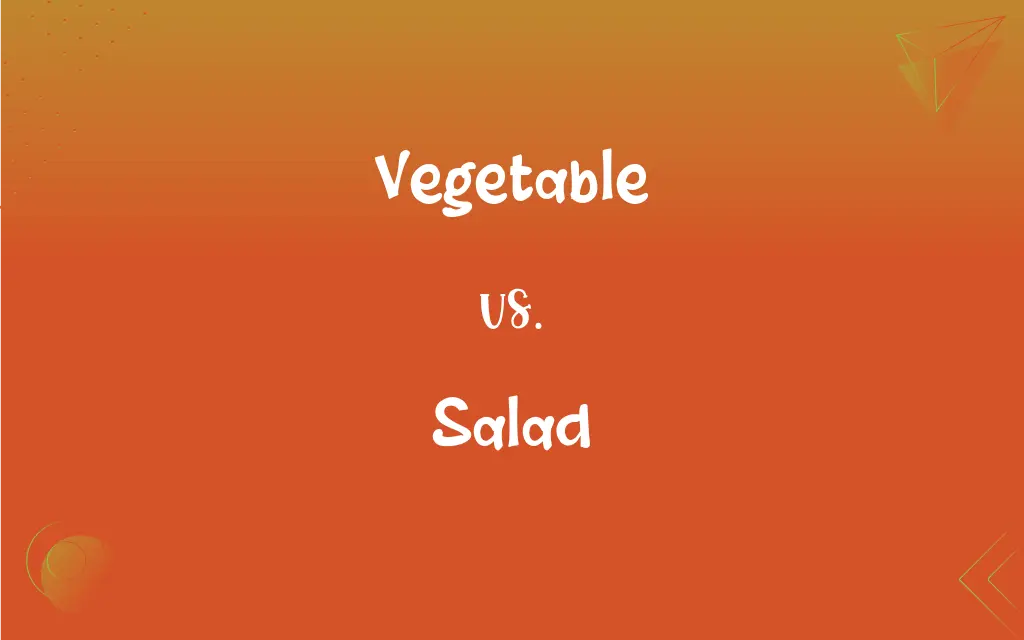Vegetable vs. Salad: What's the Difference?
Edited by Janet White || By Harlon Moss || Updated on August 25, 2024
Vegetables are edible plants or their parts, while a salad is a dish consisting of mixed vegetables or fruits, often served cold.

Key Differences
Vegetables are parts of plants consumed by humans as food, such as leaves, roots, or stems. A salad, on the other hand, refers to a dish comprising a mixture of various food items, which may include vegetables, and is usually dressed with a vinaigrette or sauce. Vegetables can be eaten raw or cooked, and they are often used as ingredients in a wide range of dishes, including salads. Conversely, salads are characterized by their method of preparation and presentation; they are typically tossed and served cold or at room temperature.
Vegetables are integral to human nutrition, providing essential vitamins, minerals, and fiber. They can stand alone as a side or main dish and can be prepared in countless ways. In contrast, salads are considered a dish rather than an ingredient, with a focus on a combination of textures and flavors. Salads may not necessarily be vegetarian; they can also include meats, cheeses, nuts, and grains.
While vegetables are categorized botanically and include a vast array of plant parts, salads are a culinary concept that doesn't strictly adhere to botanical classifications. Salads utilize vegetables to create a dish that is often appreciated for its freshness and health benefits. Vegetables are the building blocks of many meals, including salads, which highlight the natural flavors of their vegetable components through minimal cooking and fresh preparation.
Vegetables are sold in their raw form and can be stored for use in a variety of cooking methods. A salad, however, is typically consumed shortly after preparation to maintain the freshness and crispness of its ingredients. While vegetables are often seasonal, depending on the type and region, salads can be made year-round using the available vegetables and ingredients of the season.
Vegetables form an essential part of global cuisines, with specific vegetables tied to cultural dishes and practices. Salads also have cultural significance, with different regions having distinct traditional salads, like the Greek salad or Caesar salad, which are identified by their specific mix of ingredients, including various vegetables.
ADVERTISEMENT
Comparison Chart
Definition
An edible plant or part of a plant
A dish made by combining various edible ingredients, often including vegetables
State
Can be raw or cooked
Usually served raw, sometimes cooked
Role in Cuisine
Ingredient in dishes, including salads
A dish on its own, often a starter or side
Preparation
Varied methods (steamed, fried, etc.).
Typically raw, dressed, and mixed
Types
Classified botanically (root, leafy, etc.)
Classified by recipe (Greek, fruit, pasta salad, etc.)
ADVERTISEMENT
Vegetable and Salad Definitions
Vegetable
The term 'vegetable' encompasses a wide range of cultivated plants eaten by humans.
The vegetable garden was brimming with tomatoes and peppers.
Salad
A salad is a dish of mixed ingredients, typically including vegetables, served with a dressing.
She enjoyed a fresh garden salad with her dinner.
Vegetable
Vegetables are categorized by their edible parts such as leaves, stems, roots, and bulbs.
Spinach, a leafy vegetable, is rich in iron and vitamins.
Salad
Salads often serve as a cold appetizer, side dish, or main course.
For lunch, he chose a Caesar salad topped with grilled chicken.
Vegetable
In a culinary context, vegetables are often cooked to enhance flavor or texture.
Roasting the vegetables brought out their natural sweetness.
Salad
The composition of a salad can vary from simple greens to complex recipes with multiple ingredients.
The summer salad featured a medley of seasonal fruits and vegetables.
Vegetable
A vegetable is a plant or part of a plant used as food.
Carrots are a popular vegetable often found in stews.
Salad
Salads are known for being healthful and nutritious, focusing on raw, fresh produce.
After her workout, she refueled with a protein-rich quinoa salad.
Vegetable
Vegetables are usually savory or less sweet in flavor.
She diced the celery, a crunchy vegetable, for the soup.
Salad
A salad can also include ingredients like nuts, cheese, meat, or grains, beyond vegetables.
The chef garnished the salad with walnuts and blue cheese.
Vegetable
A plant cultivated for its edible parts, such as the roots of the beet, the leaves of spinach, the flower buds of broccoli, or the fruit or seeds of certain species, as beans, corn, and squash.
Salad
A dish of raw leafy green vegetables, often tossed with pieces of other raw or cooked vegetables, fruit, cheese, or other ingredients and served with a dressing.
Vegetable
The edible part of such a plant.
Salad
The course of a meal consisting of this dish.
FAQs
Can salads contain ingredients other than vegetables?
Yes, salads can include a variety of ingredients such as fruits, nuts, cheeses, and meats.
Is a fruit salad considered a type of salad?
Yes, fruit salads are a type of salad consisting mainly of mixed fruits.
Can salads be a complete meal?
Yes, salads can be a complete meal if they include a variety of ingredients providing sufficient nutrients.
Are canned vegetables as healthy as fresh ones?
Canned vegetables can be healthy, though they may have added salt or preservatives and possibly lower nutrient levels compared to fresh vegetables.
Is lettuce a necessary ingredient in all salads?
No, lettuce is common but not necessary; salads can be made with a variety of greens or without greens entirely.
Are all vegetables suitable for making a salad?
While most vegetables can be used in salads, some are more popular in cooked forms, like potatoes.
Are all vegetables low in calories?
Most vegetables are low in calories, but their caloric content can vary.
Do you need to cook vegetables before adding them to a salad?
It's not necessary; many salads are made with raw vegetables.
Can salads be served warm?
Yes, some salads like German potato salad are traditionally served warm.
What's the difference between a side salad and an entrée salad?
A side salad is smaller and served alongside the main course, while an entrée salad is larger and meant to be a main dish.
What makes a vegetable organic?
Organic vegetables are grown without synthetic pesticides, fertilizers, and GMOs, following specific regulations.
Can frozen vegetables be used in salads?
Frozen vegetables are generally not used in salads as they can be soggy once thawed, but they can be cooked first and then added to salads.
Is it necessary to wash vegetables before making a salad?
Yes, it's important to wash vegetables to remove dirt and potential contaminants.
Should vegetables be peeled before being used in a salad?
It's not always necessary to peel vegetables for salads; it depends on personal preference and the type of vegetable.
What is a tossed salad?
A tossed salad is one where the ingredients are mixed together, typically with dressing.
Are pickles considered a vegetable?
Yes, pickles are fermented or brined cucumbers, which are a type of vegetable.
Can making a salad help with weight management?
Yes, salads can be part of a balanced diet and help with weight management due to their high fiber and water content.
Are root vegetables like carrots and beets good in salads?
Yes, root vegetables can be delicious in salads, especially when they are shredded or roasted.
How do you keep a salad fresh after preparing it?
Keep it refrigerated and covered; dress it just before serving to prevent wilting.
Can dairy products be part of a salad?
Yes, dairy products like cheese and yogurt-based dressings are commonly used in salads.
About Author
Written by
Harlon MossHarlon is a seasoned quality moderator and accomplished content writer for Difference Wiki. An alumnus of the prestigious University of California, he earned his degree in Computer Science. Leveraging his academic background, Harlon brings a meticulous and informed perspective to his work, ensuring content accuracy and excellence.
Edited by
Janet WhiteJanet White has been an esteemed writer and blogger for Difference Wiki. Holding a Master's degree in Science and Medical Journalism from the prestigious Boston University, she has consistently demonstrated her expertise and passion for her field. When she's not immersed in her work, Janet relishes her time exercising, delving into a good book, and cherishing moments with friends and family.
































































